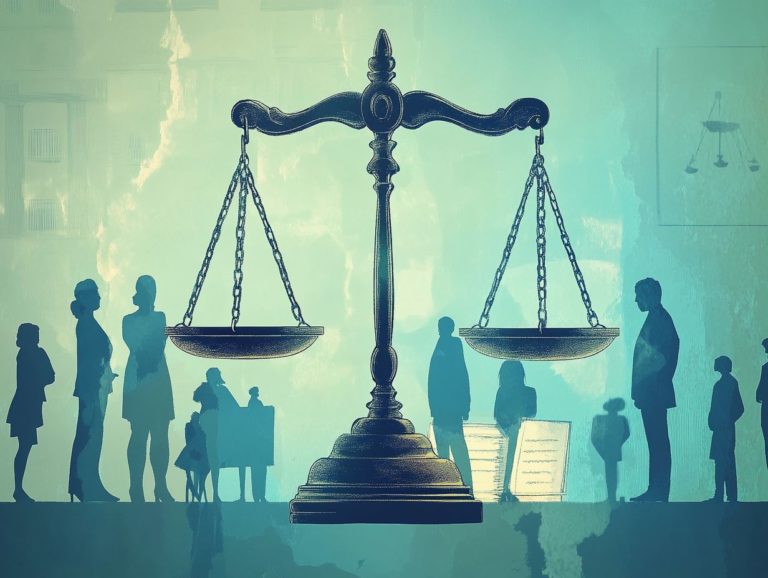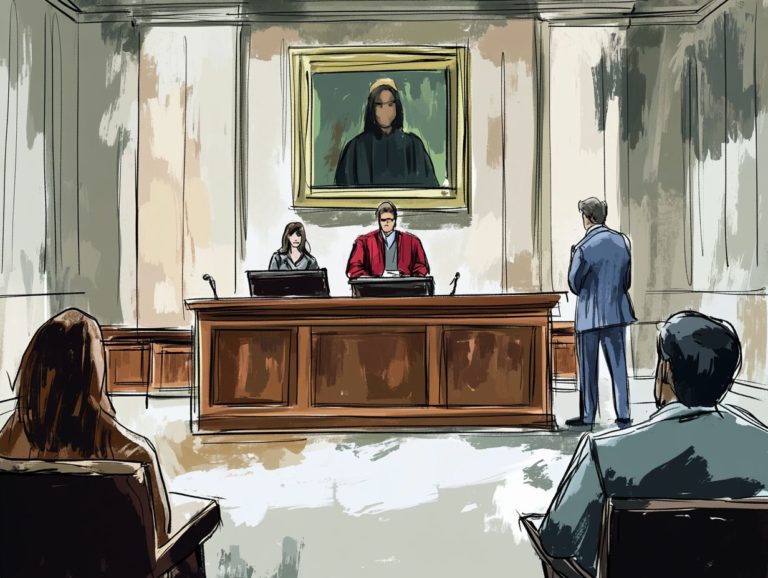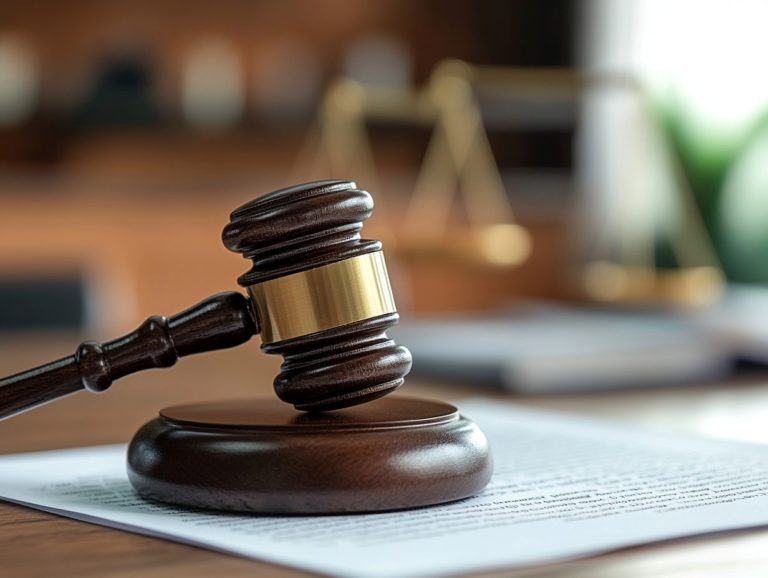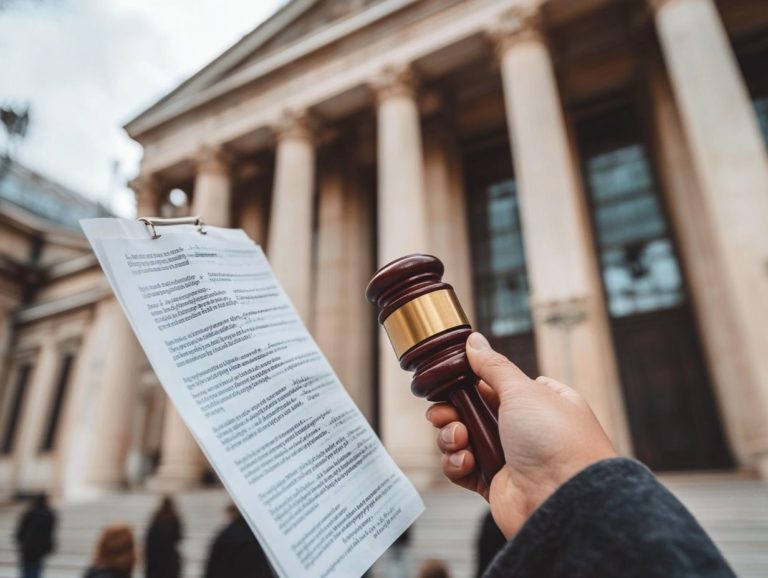Miranda Rights: Importance and Limitations
Miranda Rights are a cornerstone of the American legal system, crafted to shield you from the act of revealing information that could be used against you in court while in police custody.
Grasping what these rights encompass is essential for anyone involved in the intricate pathways of the justice system.
This article delves into the importance of Miranda Rights, illuminating their limitations and exceptions, and examining situations where they may not hold sway.
You ll discover how to assert your rights effectively and the necessary steps to take if those rights are compromised. Immerse yourself in this information to ensure you remain informed and empowered.
Contents
Key Takeaways:

Miranda Rights protect the rights of the accused during interactions with law enforcement.
Exceptions and loopholes exist in the application of Miranda Rights, potentially compromising the rights of the accused.
Knowing how to exercise and defend your Miranda Rights is crucial in ensuring a fair legal process.
Understanding Miranda Rights
Understanding Miranda Rights is essential for anyone involved in the United States criminal justice system. These rights, rooted in the U.S. Constitution, were established by the Supreme Court in the landmark case of Miranda v. Arizona.
They are crafted to protect you against self-incrimination during police questioning while ensuring that your legal counsel and individual liberties are respected. Being aware of your Miranda Rights such as the right to remain silent and the right to an attorney is crucial when you find yourself in custody, as this knowledge gives you the power to navigate potential coercive tactics employed by law enforcement.
Neglecting to invoke these rights can profoundly affect your defense strategy and the overall integrity of the judicial process.
What Are Miranda Rights?
Miranda Rights encompass the crucial legal protections you hold when facing custodial questioning by law enforcement. These rights ensure you are informed of your ability to remain silent and to have legal counsel by your side.
Grasping these rights is essential; they act as a safeguard against self-incrimination, a principle firmly rooted in the Fifth Amendment. When you find yourself in custody, law enforcement officers are obligated to clearly communicate that you have the right to decline to answer questions.
This clarity protects you from inadvertently making admissions that could later be used against you in court. You also have the right to legal counsel, allowing you to seek assistance from an attorney before or during any questioning.
The landmark case of Miranda v. Arizona (1966) underscored the necessity of these warnings, demonstrating their vital role in upholding justice and safeguarding personal freedoms within the legal framework.
The Importance of Miranda Rights
The significance of Miranda Rights cannot be overstated. They are essential in protecting the rights of the accused and reinforcing the legal safeguards within the criminal justice system.
By doing so, they help prevent wrongful convictions and ensure that individuals receive fair treatment under the law.
Protecting the Rights of the Accused

Protecting the rights of the accused stands as a cornerstone of the U.S. legal system, ensuring you have access to legal representation and due process throughout criminal proceedings. This unwavering commitment to justice manifests in a variety of vital ways.
At the forefront is the critical role of legal counsel, allowing you to navigate the often complex judicial landscape with confidence. Your attorney is your advocate, ensuring your rights are firmly upheld at every turn.
Due process acts as a crucial safeguard against arbitrary actions by the state, mandating that legal proceedings adhere to established rules and principles. This framework affords you a fair chance to present your case, ensuring your voice is heard.
Miranda Rights also play a pivotal role during questioning, informing you of your right to remain silent and your entitlement to legal counsel. This safeguard levels the playing field between you and the state, reinforcing the principle that justice should be equitable for all.
Limitaciones de los derechos de Miranda
Los derechos de Miranda son esenciales para proteger las libertades personales. Sin embargo, es crucial saber que existen limitaciones y excepciones que pueden cambiar c mo se aplican estos derechos.
Los m todos coercitivos utilizados por las fuerzas del orden y la excepci n de seguridad p blica son especialmente importantes aqu .
Excepciones y Lagunas
Existen excepciones y lagunas notables en la aplicaci n de los derechos de Miranda durante encuentros y sesiones de interrogatorio con la polic a. Esto permite a las fuerzas del orden evitar los procedimientos est ndar en ciertas circunstancias.
Por ejemplo, si los oficiales perciben una amenaza para la seguridad p blica, pueden optar por omitir las advertencias de Miranda para obtener informaci n urgente de un sospechoso que podr a evitar un peligro inminente.
Este tipo de excepci n puede justificarse en situaciones espec ficas, pero a menudo genera confusi n y malentendidos sobre los derechos de los individuos. Las complejidades de estas excepciones pueden dar lugar a escenarios en los que los sospechosos no son conscientes de sus derechos, complicando los casos e incluso generando debates sobre la legitimidad de las pruebas obtenidas de esta manera.
Estas situaciones resaltan la necesidad cr tica de una comunicaci n clara y una estricta adherencia a los protocolos establecidos para proteger los derechos individuales y abordar las preocupaciones urgentes de seguridad p blica.
Cu ndo No Se Aplican los Derechos de Miranda
Entender cu ndo no se aplican los derechos de Miranda es crucial, tanto si eres un sospechoso como un miembro de las fuerzas del orden.
Existen situaciones espec ficas en las que estos derechos pueden considerarse inaplicables, basadas en el conocimiento legal y precedentes judiciales. Conocer estas diferencias puede impactar significativamente el manejo de cuestiones legales.
Situaciones y Circunstancias Espec ficas

En situaciones espec ficas, puede haber una violaci n de los derechos, especialmente si no est s adecuadamente informado de tus derechos de Miranda durante encuentros cr ticos con la polic a.
Imagina un arresto bajo presi n, donde un oficial podr a priorizar asegurar a un sospechoso en lugar de leerle sus derechos correctamente. Esto podr a resultar en una confesi n que ser a inadmisible en un tribunal.
Del mismo modo, si te encuentras en un estado de confusi n o angustia, podr as malinterpretar tus derechos cuando se te lean. Podr as creer err neamente que los has renunciado sin comprender completamente lo que eso implica.
Estos descuidos pueden tener serias consecuencias, afectando no solo tu situaci n legal, sino tambi n planteando preocupaciones de responsabilidad para el personal de la polic a, que podr a enfrentarse a un escrutinio por no seguir los protocolos adecuados.
Estas situaciones subrayan la necesidad esencial de una comunicaci n clara para proteger los derechos de las personas y mantener la integridad del sistema de justicia penal.
C mo Ejercer Tus Derechos de Miranda
Ejercer tus derechos de Miranda es vital al interactuar con las fuerzas del orden. Al afirmar tu derecho a permanecer en silencio y tu derecho a tener un abogado presente, no solo te proteges, sino que tambi n influyes en el curso de cualquier proceso legal.
Este simple acto puede protegerte de la autoincriminaci n y asegurar que se respeten tus derechos.
Qu Hacer si Se Violaron Tus Derechos
Si sospechas que tus derechos de Miranda han sido comprometidos durante un interrogatorio policial, necesitas buscar asesor a legal sin demora para explorar tus opciones y entender las posibles implicaciones de cualquier cargo criminal.
Comprender tus derechos es de suma importancia, ya que estas protecciones aseguran que est s completamente al tanto de tu derecho a permanecer en silencio y a tener un abogado presente. Un abogado con experiencia puede guiarte a trav s de las complejidades de tu situaci n, evaluar si alguna declaraci n hecha podr a usarse en tu contra y ofrecerte un consejo s lido sobre c mo avanzar.
El concepto de privilegio abogado-cliente es crucial en estas discusiones, permiti ndote comunicarte abiertamente sobre tu caso sin preocuparte de que tus palabras puedan ser invocadas en tu contra en un tribunal. Esta confidencialidad es esencial para construir una estrategia de defensa s lida, adaptada a tus circunstancias nicas.
Preguntas Frecuentes
What Are Miranda Rights and Why Are They Important?
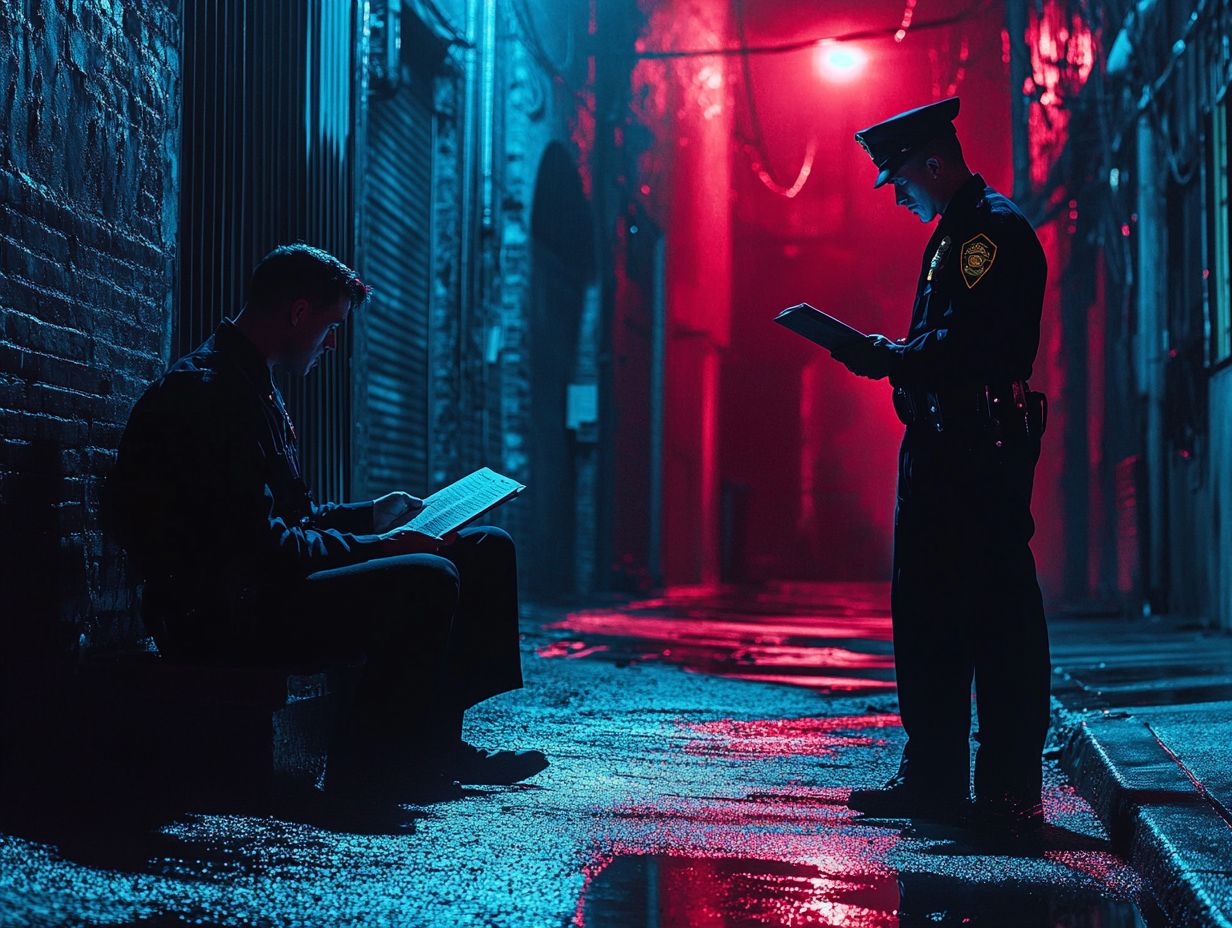
Miranda Rights are legal rights read to individuals during an arrest or interrogation. They protect your Fifth Amendment rights against self-incrimination and your Sixth Amendment right to an attorney.
What Are the Limitations of Miranda Rights?
Miranda Rights primarily apply during police questioning in custody. They don’t cover voluntary statements or anything said outside of an interrogation.
What Happens If My Miranda Rights Are Not Read?
If your rights aren’t read, statements made during questioning may not be used in court. This can significantly impact your criminal case.
Do Miranda Rights Apply to All Situations?
No, they only apply during police questioning when you are in custody. They do not apply to interactions with private citizens or routine traffic stops.
Can I Waive My Miranda Rights?
Yes, you can waive your rights if you fully understand them and choose to do so voluntarily. Make sure you know the consequences of waiving those rights.
What Should I Do If I’m Unsure About My Miranda Rights?
If you’re unsure about your rights, it’s best to remain silent and ask for an attorney. Remember, you have the right to stay silent and have a lawyer present during questioning.

